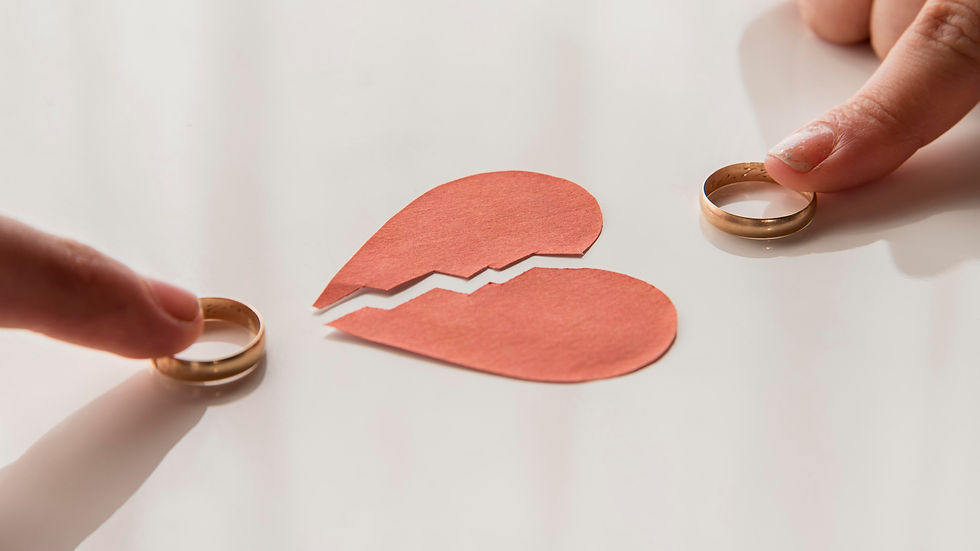Grieving the Loss of a Relationship: Understanding Divorce as a Form of Grief
- Kimberly Freeman, BA.Psych, Dip.Couns, Registered Counsellor

- May 13, 2025
- 3 min read
Updated: Jun 22, 2025
Much like the death of a loved one, divorce can trigger intense feelings of grief. Sadness, anger, confusion, and a profound sense of disorientation are just some of the feelings we can experience.
The life you imagined has changed. The shared dreams, routines, and identity you once had may no longer exist, and that shift can leave you grieving what was—and what could have been.
"Divorce isn't just the end of a marriage; it's the end of a life you once dreamed together."— Unknown

When Divorce Feels Like Grief
As a counsellor supporting individuals and families through loss and transition, I’ve walked alongside many people navigating the emotional impact of separation. I’ve seen how divorce can affect every part of a person’s life—from their sense of self to their mental health and daily routines.
Grief isn’t limited to death. It’s a response to any meaningful loss—and divorce often brings several at once:
The loss of a partner or life companion
The loss of shared dreams or future plans
The loss of stability and daily routine
The loss of identity as part of a couple or family
The loss of community and shared social connections
These overlapping losses make divorce grief complex—and often misunderstood. You might be told to "move on" or "look on the bright side," but emotionally, it’s much more layered than that.
Common Emotional Responses After Divorce
Each person’s experience is unique, but many people navigating divorce grief share similar emotional responses, including:
Shock or disbelief – Even if you chose the separation, the finality can still feel surreal.
Anger or resentment – Toward your ex-partner, yourself, or the situation.
Sadness or depression – Mourning the relationship or the future that won’t happen.
Guilt – Particularly when children are involved.
Fear – Around finances, parenting, or what comes next.
Relief—and guilt about feeling relieved – Especially in high-conflict relationships.
It’s completely normal to feel more than one emotion at once, or to move through them in waves.
Supporting Children While Grieving Divorce
Divorce can be even more emotionally complex when children are involved. As a parent, you may feel a responsibility to “hold it all together,” even while you’re grieving yourself.
In counselling, I often hear quiet, vulnerable questions like: "Will my kids be okay?" "How do I support them when I’m barely holding on?"
These are valid and important concerns. Divorce does change family dynamics, but children can cope and even thrive with open communication, emotional support, and consistency. It’s okay to seek help—for them and for yourself.
How to Begin Healing from Divorce Grief
Healing after divorce is a process. There’s no single timeline or roadmap, but there are steps you can take to start moving forward:
Acknowledge Your Grief - Don’t downplay it. Your loss is real, even if others don’t fully understand it. Even if you initiated it.
Reach Out for Support - Talk to a counsellor, join a support group, or open up to someone you trust. Connection is key. Often times we feel embarassed that our relationship ended. Speaking with others who have had similar experiences can help us to realise, it's not just us. It's ok. We'll be ok.
Create New Routines- When everything else feels uncertain, routines can provide stability and a sense of control. It takes 90 days to build new habits without having our life upended. Be patient with yourself. It took time to learn to live with this person. It will take time to learn to live without them in teh same way.
Practice Self-Compassion- This is a major life transition. Be kind to yourself on the hard days and celebrate the small wins.
Seek Professional Counselling- Counselling offers a safe, non-judgmental space to process your emotions and begin to rebuild. A neutral support person can help you work through the emotional layers and clarify your next steps.
You’re Not Alone in This
Grieving after divorce isn’t a weakness—it’s a natural, human response to the end of something meaningful. Whether the separation happened recently or years ago, it’s never too late to heal, reclaim your identity, and discover new purpose.
If you’re facing the emotional weight of divorce and feeling unsure where to turn, I’m here to support you. I offer counselling services on the Sunshine Coast and online across Australia and Canada, helping people like you move through grief with compassion and clarity.
Need support?You don’t have to go through this alone. Reach out today to begin your healing journey.

Kimberly Freeman,
BA Psychology, Dip Counselling, Registered Counsellor,
is the founder of Shifting Perspective Counselling, based on the Sunshine Coast, Australia. She offers compassionate, client-centred support for those navigating grief, loss, and life transitions both in person and online.





Comments